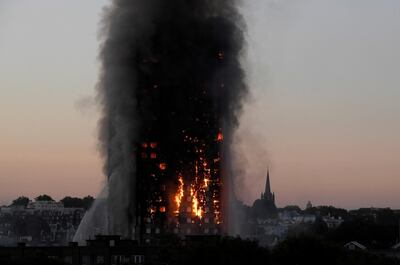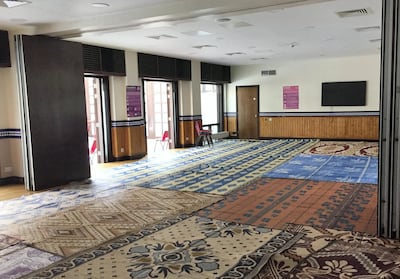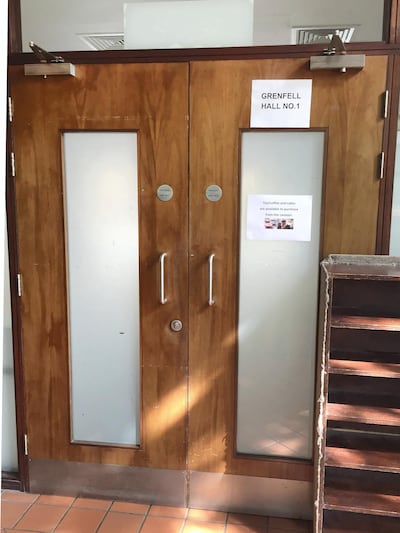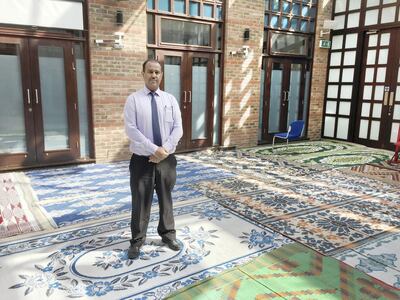Exactly two years ago during the early hours of the morning, Abdurahman Sayed left his home in east London for Al-Manaar Muslim Cultural Heritage Centre in Westbourne Park, on the other side of the city.
It was a busy time of year for Abdurahman, who manages the faith centre and its mosque. It was the 19th day of Ramadan and he was helping the centre to prepare for the last 10 days.
He had been at the mosque until midnight the previous evening for taraweeh prayers and was not planning to head back until noon.
But at 5am, Abdurahman received an urgent message from a colleague. There was a huge fire in the nearby Grenfell Tower.
The blaze killed 72 people and injured more than 70. Although the disaster happened two years ago, the inquiry into it continues today.
"When they told me about the fire, my colleagues asked me whether we should open the doors of Al-Manaar for people who lived in the building so they could shelter," Abdurahman tells The National.
"Immediately I replied, ‘Yes, and open the door to anyone’.”

Abdurahman went straight to tower, about a 10-minute walk from Al-Manaar, to find all surrounding roads had been cordoned off by police.
Some people at the mosque were among the first see the blaze as they were leaving in the evening after prayers.
Abdurahman tried to get through to the tower. He told the police that he had dates and water for Muslims breaking their fast, which he would give anyone who was affected by the fire.
After being turned back, he went to the centre and called police, asking whether he could have assistance to take supplies and goods to the building.
Later that morning, the police sent two officers to escort Abdurahman to the tower. When he arrived, he saw the huge flames and smoke billowing.
He had to control his emotions to be able to assist through the emergency period.
After giving supplies, water and dates to a nearby Methodist church, Abdurahman returned to the centre just before noon to find the streets congested with people bringing donations and supplies to the mosque.
“That's how it all started that day,” he says. “I initially thought it would be an issue for a few hours and it would be under control, but it kept going on and on.
"We realised later on that this was a huge problem for the community as well as the authorities, and for all those people left behind in the fire, some of whom we knew very well.”
They included volunteers at the mosque and people who regularly prayed there.
The fire in Grenfell Tower broke out about 12.50am on Wednesday morning and took more than 24 hours to contain.

Working around the clock, those at the centre distributed supplies to survivors. It was one of only five emergency centres in the borough at the time, says Abdurahman, and packages included toiletries, clothes and bed linen.
“People were really generous – not only the local community but the entire nation,” he says. “People were coming with from supplies from Manchester and Birmingham, all sorts of places.
"The whole nation was up and supporting any way they could.”
Abdurahman later started to realise that survivors of the fire would need emotional support, as well as supplies and financial assistance.
A few days after the fire, Al-Manaar began receiving volunteers from the National Health Service, the Red Cross and other organisations.
Volunteers at the centre offered bereavement support through counselling services, and later even acupuncture and art therapy.
Weeks later, the community and public were up in arms because survivors still had no idea what happened to those who were considered to be “missing”.
The official death toll kept rising, more questions were left unanswered and anger was growing in the community.
Abdurahman says it was the mosque’s role to ease this anger. Volunteers organised interfaith prayers and later prayers for those who died in the fire.
The centre also organised meetings between the community and the authorities, fire services, police and central government, bridging the gap between the state and the survivors.
That meant organising and setting the tone for the meetings, ensuring everyone could express their anger while guaranteeing the safety of officials.
It was a delicate balance for Abdurahman and his colleagues.

Al-Manaar also faced other challenges.
“We were quite short in terms of staff," Abdurahman says. "We only had two full-time staff at the time."
The mosque was full of people needing help and volunteers delivering resources.
“All of this happened at the same time and there were hundreds if not thousands of people arriving, so the whole street around the centre was packed,” Abdurahman says.
The team at Al-Manaar were so entrenched in the emergency response that they had no clue what was going on outside the mosque and the surrounding area.
On the ground floor of the centre, there were two halls where the fire survivors could come at any time. They have since been named “Grenfell 1” and “Grenfell 2”.
If the survivors needed privacy, they could go to rooms upstairs and sit in the counselling and training rooms, as well as a library.
Abdurahman says it was crucial for the mosque to have an open-door policy, but he stresses that the dignity of the bereaved must be respected and they must not be questioned about their grief.
The mosque community felt grief of its own. One of Abdurahman’s colleagues, Hassan Awad, lived on the 23rd floor of the tower and lost his wife Rania Ibrahim and two daughters in the fire.
Rania was also a volunteer at Al-Manaar, where she and Hassan met. He was abroad at time of the fire, but raced home after she uploaded a video from inside the tower block when the fire broke out.

It was weeks before Hassan was told he could recover the bodies of his family members.
“He stayed with us for quite a long period,” Abdurahman says. “Although he was offered a place in a hotel, he was just too traumatised to stay there.
"From here, he would often walk to the tower and around it before coming back to receive guests who wanted to pay respects to his family.”
Many survivors were transferred to hotels as temporary accommodation. Some felt so isolated that they locked themselves in their rooms.
To stop them being alone with their grief in a hotel, the mosque invited them to stay. It became a place where anyone in the community, regardless of their creed or religion, could come for support.
One man, who did not live in the tower, went to Al-Manaar asking for private space to pray.
He was Christian and he asked Abdurahman for a candle and light. Abdurahman smiles as he mentions it because unlike churches, mosques often do not have those items at hand.
He later learnt the man had lost his brother in the fire, but was surprised that he had come to the mosque to pray instead of one of the neighbourhood churches.
Abdurahman recalls what the man said to him: "I know you guys are good people and have been doing a lot, so that's why I chose to come here and pray for my brother.”
Then the man shook his hand and left.
“I was astonished. I didn't know how to react,” Abdurahman says. “The fact that he chose this place when he could have gone to any local church just touched me.
"That's the first and the last time I saw him."
The fire was one of the worst disasters in recent British history but Abdurahman says some positives have come out of it.
Al Manaar has, since the tragedy, hosted a winter shelter for the homeless for the past two years. Up to 17 homeless people stay with them between October and February. Abdurahman wants to continue it.

He says the disaster also helped to unite the community.
“We always had interfaith networks but now the faith community in North Kensington is more unified, co-ordinating events together and sometimes organising winter and summer camps,” Abdurahman says.
“We run art therapy with our colleagues from West London synagogue too. Those partnerships have become stronger and deeper.”
Organisers of a ceremony at St Paul’s Cathedral to commemorate six months since the fire did most of their planning at Al-Manaar. The mosque also runs community iftars.
Last month, it hosted a multifaith iftar to remember the Grenfell tragedy, with the Muslim Mayor of London, Sadiq Khan, and broadcast journalist John Snow speaking at the event.
About a year after the disaster, a group of women who survived the fire approached Al-Manaar and asked if they could use its kitchen because they did not have one in their hotel.
The mosque immediately agreed and started to offer the space on Tuesdays and Thursdays, between 11am and 4pm.
Cooking twice a week helped the women escape their trauma and exchange recipes with friends and neighbours. Since September 2018, the kitchen has been open seven days a week for community members who want to use it.
It eventually developed into a community project with the support of the Duchess of Sussex, Meghan Markle, and a book called Together, based on recipes cooked in the mosque, was released in 2018. It became a best seller.
Some of the women behind the book have gone on to run catering businesses and develop social enterprises.
Although it has been two years since the fire, for Abdurahman it feels as if only weeks have passed because he has been so immersed in the emergency response.
He has sat on the Grenfell Recovery Scrutiny Committee and has been approached for advice on the fate of Grenfell Tower, which is still to be determined.
Abdurahman says the decision should be left to the bereaved families, because "their opinions matter the most”.
The response to the disaster continues, even today. The counselling service for survivors and families of the victims is still running and Al-Manaar continues to be approached by ministers and government services for advice.
The centre is looking to extend its counselling services and is negotiating funds from the council and NHS.
Two years later, Grenfell continues to resonate.
As the sun goes down for maghrib prayers, those at the mosque remember the victims of the fire. And although many of the survivors have now found new houses, Al-Manaar Muslim Cultural Heritage Centre will always be a second home.

